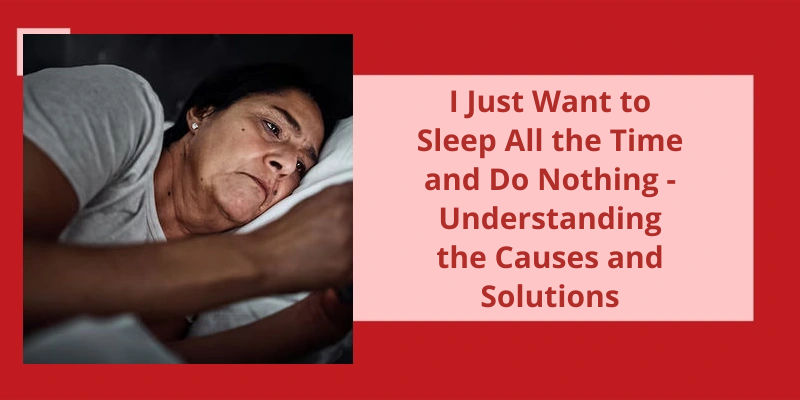In today's fast-paced world, where productivity and achievement are highly valued, there’s a growing number of individuals who find themselves experiencing an overwhelming desire to sleep all the time and do nothing. This phenomenon has raised concerns, both for the individuals themselves and for those around them, as it can have significant impacts on their personal and professional lives. Understanding the causes behind this pervasive desire to sleep and do nothing is crucial in order to provide effective solutions and support for those who’re affected. This article delves into the underlying factors that contribute to this state of mind, such as chronic fatigue, depression, and burnout, while also exploring potential strategies to overcome these challenges and regain a sense of purpose and motivation. By delving into the complexities of this issue, we aim to shed light on a topic that often goes unnoticed and provide guidance for individuals who’re longing to break free from the grip of perpetual fatigue and inactivity.
Why Am I So Sleepy During the Day for No Reason?
Excessive sleepiness during the day for no apparent reason can be a frustrating and debilitating problem. One of the most common causes is chronic sleep deprivation. Many people simply don’t get enough sleep each night, whether it’s due to work, family responsibilities, or other factors.
Sleep apnea is a condition in which a persons breathing is repeatedly interrupted during sleep, leading to poor sleep quality and excessive daytime sleepiness. Insomnia, on the other hand, is characterized by difficulty falling asleep or staying asleep, which can lead to chronic sleep deprivation and daytime drowsiness.
Mental health conditions, particularly depression, can also contribute to excessive sleepiness. The lack of energy and motivation associated with depression can lead to a constant desire to sleep and do nothing.
Certain medications can also cause daytime drowsiness as a side effect. These may include sedatives, antihistamines, and medications used to treat certain medical conditions. If you suspect that your medication is causing your excessive sleepiness, it’s important to speak with your healthcare provider to discuss alternative options.
These may include neurological disorders like narcolepsy, which is characterized by excessive daytime sleepiness and sudden sleep attacks, as well as hormonal imbalances, such as hypothyroidism or adrenal insufficiency.
If you suspect that chronic sleep deprivation or a sleep disorder is to blame, it may be helpful to improve sleep hygiene and seek medical evaluation. If mental health conditions or medication side effects are contributing factors, it’s important to work with a healthcare provider to address these issues. In some cases, lifestyle changes, such as regular exercise and stress management techniques, may also help improve daytime alertness.
Narcolepsy, a sleep disorder characterized by excessive daytime drowsiness, poses significant challenges to those who live with it. The constant struggle to stay awake and the sudden uncontrollable episodes of sleep can disrupt their daily lives, leading to various complications.
What Disease Makes You Want to Sleep All the Time?
Narcolepsy, a neurological sleep disorder, is characterized by an overwhelming desire to sleep and an inability to regulate sleep-wake cycles efficiently. One of the hallmark symptoms of narcolepsy is excessive daytime sleepiness, which leads individuals to constantly feel drowsy and nod off at unexpected times. It can significantly impact their ability to function properly, hindering their daily routine and performance in various tasks.
The main cause of narcolepsy is still not fully understood, but it’s thought to be linked to a deficiency in the production of hypocretin, a brain chemical that helps regulate wakefulness and REM sleep. This shortage of hypocretin is believed to be a result of an autoimmune response, where the bodys immune system mistakenly attacks the brain cells responsible for it’s production.
While there’s no cure for narcolepsy, several treatment options are available to alleviate the symptoms and improve overall quality of life. Medications like stimulants and antidepressants can help manage daytime sleepiness and control sleep attacks. Additionally, lifestyle adjustments, such as maintaining a regular sleep schedule, incorporating short naps, and avoiding stimulants like caffeine and alcohol, can also be beneficial.
Furthermore, support and understanding from family, friends, and employers play a crucial role in managing narcolepsy. Educating oneself and others about the condition can help reduce stigma and encourage empathy towards individuals experiencing excessive sleepiness. Seeking the guidance of healthcare professionals, such as sleep specialists, can provide tailored strategies and support to cope with narcolepsy effectively.
Understanding the causes, seeking appropriate medical intervention, and implementing lifestyle modifications can help individuals with narcolepsy manage their symptoms and regain control over their lives.
Strategies for Managing Narcolepsy in the Workplace
- Implement flexible work schedules and allow for short naps during the day.
- Provide a quiet and comfortable space for employees to rest or sleep if needed.
- Encourage regular breaks to help manage fatigue and improve focus.
- Ensure proper lighting and temperature control in the workplace to promote alertness.
- Support open communication between employees and supervisors regarding their condition and any necessary accommodations.
- Offer accommodations such as telecommuting or shift adjustments to minimize the impact of narcolepsy symptoms.
- Provide education and training to coworkers and supervisors to raise awareness and understanding of narcolepsy.
- Consider making adjustments to workload or job responsibilities to reduce stress and fatigue.
- Encourage the use of assistive devices or technologies to help manage symptoms, such as alarms or reminders.
- Collaborate with healthcare professionals to develop personalized strategies for managing narcolepsy in the workplace.
Source: Narcolepsy – Symptoms and causes – Mayo Clinic
Conclusion
In conclusion, the phenomenon of wanting to sleep all the time and doing nothing can stem from a variety of underlying causes, both psychological and physiological. The desire for excessive sleep and a lack of motivation can be linked to depression, chronic fatigue syndrome, sleep disorders, and even lifestyle factors such as poor diet and lack of exercise. It’s crucial to recognize and address the root cause of this feeling, as it can significantly impact one's physical and mental well-being. Understanding the causes and seeking appropriate solutions, such as therapy, medication, lifestyle changes, and self-care practices, are key in finding relief and regaining a sense of purpose and vitality in life. Remember, it’s important to consult with a healthcare professional to determine the most suitable course of action for your specific situation.






